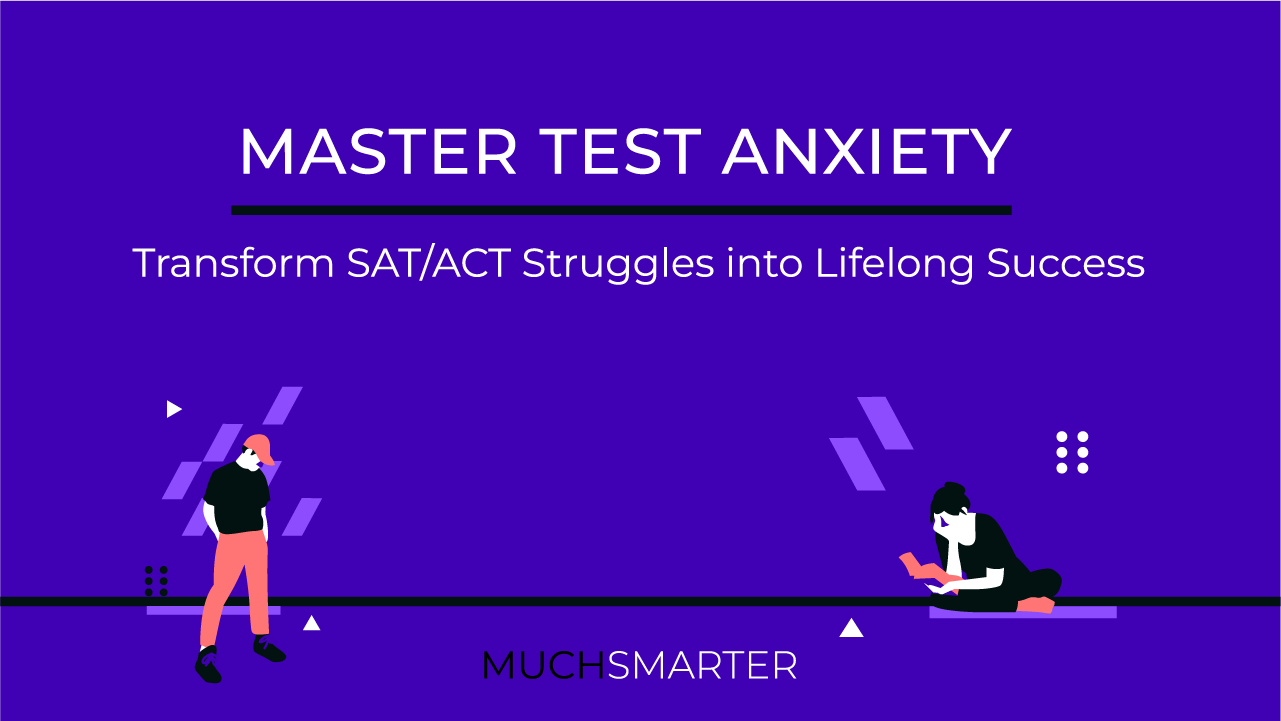


Does your teenager get anxious on big tests, like the SAT and ACT?
Do they do OK in the classroom, OK in practice, and then fall flat come test day?
And if they take the big test again, does the cycle repeat?
Your teenager can turn this challenge into an opportunity for success – not just on the SAT, but for life!
Test anxiety arises from the pressure that teenagers feel, particularly when it comes to big tests like the SAT or ACT.
So, understanding where test anxiety comes from, let’s ask: why does it matter? Why and how does test anxiety interfere with performance on the SAT and ACT?
In effect, the brain shuts down.
When people feel an excess of anxiety or stress, it triggers an automatic nervous system response that we’ve all inherited from our ancestors, who lived in a time when physical danger was present every day.
The response is called “fight or flight” because our ancestors had to react to danger by fighting or feeling. Those are the only two choices when we come across a sabre-tooth tiger in our path, right?
In the “fight or flight” response, energy is drawn away from the brain and into the body to prepare the body to fight or flee the danger.
Now, whether it’s real physical danger or just the feeling of danger arising from anxiety, energy is drawn away from the brain and into the body.
So, the brain does not have all the resources it needs to do its work.
Fight or flight is an effective way for the body to respond to danger, but it is not helpful for the kind of thinking your teenager needs on an exam.
If the brain shuts down even partially, how well is your teenager going to do?
The thing is, anxiety can interfere with performance even if the anxiety appears in a mild form.
Have you ever had the experience of trying too hard on a task?
You're trying to solve a problem, and the harder you try, the farther away the solution seems.
Here's why:
Much of our mental performance involves non-conscious activity of our brains. Everything we do involves coordination of many different areas of the brain and it all happens unimaginably quickly!
Now, when we're trying too hard, it's like trying to coordinate lightning-fast non-conscious processing with the conscious part of our brain, which operates much more slowly.
The result -- we feel like we are trying too hard and our mental performance is far from our best.
You can see the effects of trying too hard in sports too!
When we try too hard in sports, it's as if our conscious brain is trying to direct the activities of hundreds of muscles all at once -- a task that is easily accomplished by the non-conscious brain, but not by the conscious brain.
Can you imagine performing a golf or tennis swing with your conscious brain telling each individual muscle what to do? The conscious brain can't do it! The result? an ineffective swing!
And that's what happens even with mild forms of performance anxiety:
The conscious mind tries to do what the nonconscious should be doing and the conscious mind just can't do that job.
So, whether the test anxiety is severe or in a mild form, the student is simply unable to perform up to their capability.
Talk about frustrating!
So your teenager could be trying too hard to do something they are fully capable of doing, but they are unable to do it in a performance situation because they are, in that situation, unable to let their non-conscious brain do the work for them.
The test that's easy for them when they are practicing on the kitchen table suddenly becomes very hard.
Make no mistake, this is very real -- we've actually seen teenagers easily handle a test in practice and fumble the exact same test in a setting that's like the real SAT or ACT.
In part 3 of this article, I’ll introduce you to the solution: how you can guide your teenager to transform their struggle with test anxiety into a skill for lifelong success!